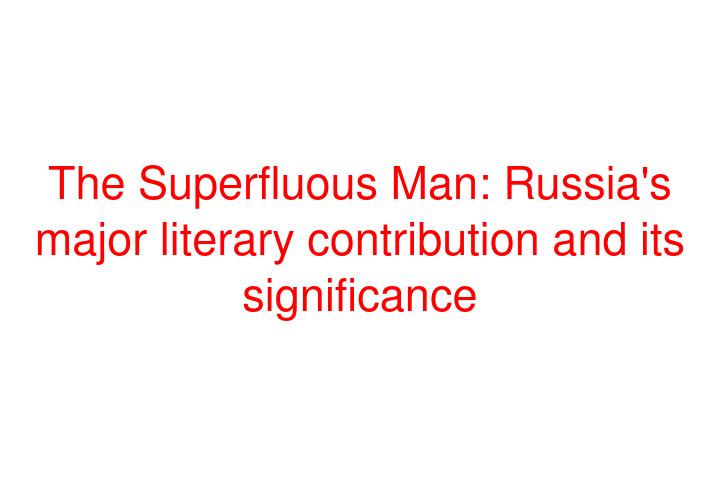 By Vikas Datta
By Vikas Datta
The Russian Revolution led by Lenin, which had its 100th anniversary on Tuesday, can be assailed on many counts, but literary connoisseurs could chiefly fault it on one. This would be ensuring the disappearance of a prominent mainstay of classical Russian literature and its archetypical contribution to the tradition -- the "Superfluous Man" who was unfit for the new working class trend of "Socialist Realism".
This is rather a pity, for the "Lishniy Chilovek", as he was in the original Russian, was a rather interesting character despite his obvious flaws and being more of a product of the times he flourished in.
And, no matter how ineffectual and cynically resigned in his immortal portrayals by the greatest Russian writers from Pushkin to Dostoyevsky to Tolstoy, the Superfluous Man was more durable than seemed apparent.
Even after all the upheaval -- the revolution, the Civil War, the social tumult, the Stalinist repression, et al -- he reappeared in Russian literature under new guises as soon as conditions relaxed even marginally. And then he -- sorry, feminists, the Man is an integral part of the term and besides, why would you really want a "Superfluous Woman?" -- also expanded his reach to figure not only in works by others set in Russia, but also elsewhere, of course suitably adapted to contemporary, local conditions.
But what actually we must know first is what a Superfluous Man is, how did he spring up and where all have we seen him.
Generally considered the Russian counterpart to the Byronic Hero (featured here a few instalments back), he is rather a unique subset for there are some differences.
While Byronic heroes, generally male (though women are not unknown) and high class, are flawed, charismatic, passionate, can behave both with charm as well outrageously, seem to harbour dark secrets or brooding on perceived injustices, the Russian guy is also characterised by a privileged background but still disregarding social values, can be sans empathy, and careless of others' feelings.
He also displays high levels of cynicism, existential boredom, rampant hedonism (chiefly drinking, gambling, romantic intrigue, duel-fighting, a combination thereof or all), and is often a nihilist and fatalist.
The character first appeared in Ivan Turgenev's "The Diary of a Superfluous Man" (1850), which also gave him his name. This is the story of Tchulkaturin, who leads a comfortable but dreary and purposeless life, but is shocked when a doctor tells him he is in the final stage of a terminal illness.
In the two weeks left to him, our hero starts a diary, recounting his life and finding its only prominent event was the time when he fell in love but it was not reciprocated. This led him to a duel whose non-fatal outcome left him convinced of the futility of his life and a disinclination against doing anything to change it.
The work's popularity did the same for the character type, with critic Vissarion Belinsky terming it a by-product of Czar Nicholas I's reign (1825-55). Marked by territorial expansion but also intolerance, economic stagnation, maladministration and corruption, it saw the best-qualified men not inclined to enter government service and, without other meaningful options, chose to live out their life in passivity.
The Superfluous Man was then used to designate characters of the even earlier classics, right from Alexander Pushkin's path-breaking "Eugene Onegin" (1825-32), where the eponymous hero doesn't do much about his life, allows the girl who loves him to marry another, and then ends up killing his best friend in a duel. But, in another way, this work also parodies the trope-to-be.
A better example is the aloof Maxim Maximych Pechorin of Mikhail Lermontov's haunting "A Hero of Our Time" (1840), who feels: "What of it? If I die, I die. It will be no great loss to the world, and I am thoroughly bored with life. I am like a man yawning at a ball; the only reason he does not go home to bed is that his carriage has not arrived yet."
Then there is the rather caddish Vladimir Beltov of Alexander Herzen's "Who is to Blame?" (1845-46), the eponymous character of Ivan Goncharov's "Oblomov" (1859), who doesn't even get out of bed in the first 150 pages, the rather sympathetic Count Pyotr 'Pierre' Bezukhov and Prince Andrei Bolkonsky of Leo Tolstoy's "War and Peace" (1865) and many more.
A case may be made, in some respects, for Dr Yuri Zhivago of Boris Pasternak's 1957 novel, but also Bartholomew "Barley" Blair of John Le Carre's "The Russia House" (1989), till he makes his fateful decision. And as said, the character can also be found in different climes under different names.
But the Superfluous Man's importance lies in the awareness that his alienation, his behaviour and his choices were his responsibility as much as they were of his society/social circles, which did not appreciate his unconventionality without recognising its/their contribution to this outcome. That is the tragedy.
(Vikas Datta is an Associate Editor at IANS. The views expressed are personal. He can be contacted at vikas.d@ians.in)
(This story has not been edited by Social News XYZ staff and is auto-generated from a syndicated feed.)
About VDC
Doraiah Chowdary Vundavally is a Software engineer at VTech . He is the news editor of SocialNews.XYZ and Freelance writer-contributes Telugu and English Columns on Films, Politics, and Gossips. He is the primary contributor for South Cinema Section of SocialNews.XYZ. His mission is to help to develop SocialNews.XYZ into a News website that has no bias or judgement towards any.
